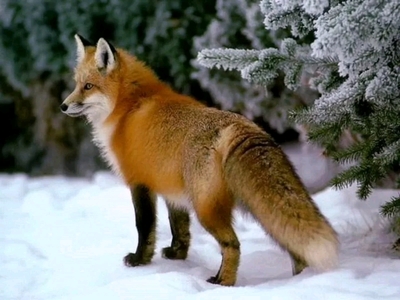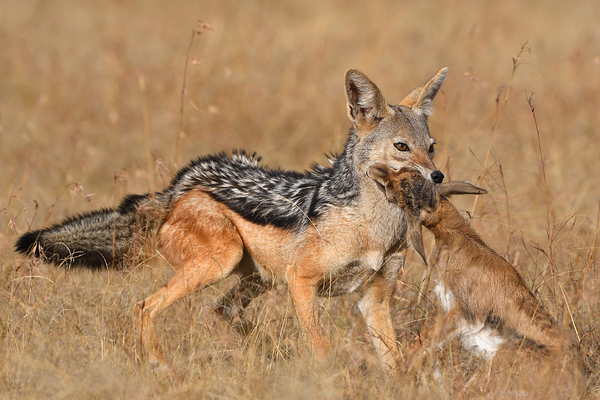Vulpes
IUCN
LCBasic Information
Feature
Highly adaptable animals
Distribution and Habitat
Forests, grasslands, deserts, mountains and suburbs
Appearance
An animal with pointed ears, a triangular head, a slender body, and soft skin. It has a slender body, a pointed mouth, big ears, short limbs, and a long tail behind it.
Details
Foxes (scientific name: Vulpes) are omnivorous animals widely distributed around the world, mainly living in forests, grasslands, deserts, mountains and suburban areas. Their diet is flexible and changeable, depending on the habitat and seasonal changes. The diet of foxes mainly consists of meat, plant foods and foods from other sources.

1. Meat
Foxes are omnivores, but meat is a major part of their diet. Foxes are efficient predators, often hunting small mammals such as mice, voles, rabbits, squirrels, etc. They also prey on birds, reptiles, insects and other small animals. For example, foxes will quietly approach their prey, then quickly pounce on it, capture it with its sharp teeth and claws, and quickly devour it.
Foxes also take advantage of opportunities to scavenger dead animals. Scavenging can provide an important source of energy for foxes, especially during seasons when prey is scarce, such as winter. Foxes have a keen sense of smell and can detect dead animals from a distance. Scavenging behavior not only helps foxes obtain nutrition, but also plays a cleansing role in the ecosystem.
2. Plant-based foods
In addition to meat, foxes will also eat plant foods, especially when food resources are scarce. They like to eat a variety of berries, fruits, seeds, weeds and vegetables. For example, foxes often eat blueberries, strawberries, apples, cherries and other fruits. Foxes' demand for plant foods usually increases in the fall, because many small mammals begin to reduce their activities during this period, and plant foods are relatively easy to obtain.
Eating plants not only provides foxes with an additional source of energy, but also helps them maintain a balanced diet throughout the seasons. In particular, certain fruits are rich in vitamins, minerals, and fiber, which are particularly important for fox health.
3. Insects and other small invertebrates
Insects are also an important part of the fox diet, especially in warmer seasons. Foxes will eat invertebrates such as beetles, ants, butterflies, moths, spiders, centipedes, etc. Insects are a high-protein source of nutrition for foxes, especially when their main prey is difficult to catch. Insects and other small invertebrates can provide foxes with a large amount of protein.
Foxes usually use a fast and flexible capture method when hunting insects. After approaching the insect, they slap or grab it with their front paws and then quickly swallow it. In addition, near some water bodies, foxes also prey on mollusks such as snails or crabs.
4. Food produced by human activities
In some cases, foxes will also approach human settlements and obtain food from human garbage. These urban foxes tend to live in suburban areas, city parks, or garbage dumps. They will search for edible remnants such as meat scraps, leftovers, and even pet food in garbage cans. This opportunistic behavior allows urban foxes to adapt to complex environments and obtain sufficient energy when food is scarce.
Although foxes sometimes benefit from human activity, this also poses potential dangers. Human garbage and food scraps may contain chemicals or plastic fragments that are harmful to foxes, which can have a negative impact on their health in the long term.
5. Foxes’ water needs
Foxes, like other wild animals, need water to maintain physiological functions. They usually drink water from water sources such as streams, rivers, lakes, and ponds. In arid areas, foxes may obtain water from their food, especially juicy fruits and plants. This ability allows foxes to survive in relatively arid environments.
6. Seasonal changes in fox food choices
Foxes' food choices change during the different seasons of the year. In the warm spring and summer, foxes tend to hunt small mammals and insects, consuming less plant food. However, in the fall and winter, many small mammals hibernate or become less active, and prey resources become scarce for foxes. As a result, foxes rely more on fruits, berries, and other plant foods.
Winter is a serious challenge for foxes, as they need more energy to maintain body temperature and survive. When food is scarce, foxes will show amazing adaptability, digging for food caches or looking for prey under the snow. At the same time, foxes may also more frequently seek out scavenging or approach human settlements to obtain food.
7. Fox’s hunting skills
Foxes are natural hunters, especially known for their excellent hunting skills. Foxes have extremely keen hearing and can detect even the slightest noises made by their prey, such as the sound of a mouse crawling under the snow. They quickly locate their prey and pounce on it with a quick leap. This hunting method is not only efficient, but also greatly increases the fox's chances of survival when food is scarce.
In addition, foxes are good at using the night to hunt. They usually go out at dawn or dusk, when many small mammals and birds are just beginning or ending their day's activities, giving foxes the best hunting opportunities. Nocturnal activities also allow foxes to avoid direct competition with other predators.
As an extremely adaptable animal, foxes have a diverse diet that includes both animal and plant foods. Meat is their main food source, but when necessary, foxes will also eat fruits, insects and other foods, and even obtain food from human activities. Changes in seasons and habitats affect the food choices of foxes. Foxes rely on excellent hunting skills and adaptability to find enough food to survive in various environments.









